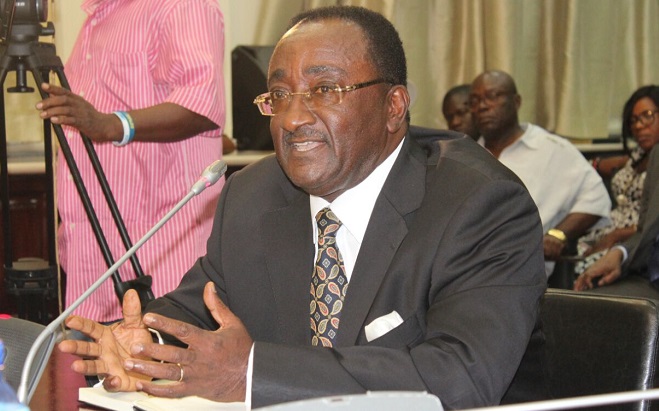
No ban on poultry imports - Govt says
The government has no plan of banning poultry imports into the country; it will rather concentrate on building the capacity of the poultry industry.
The Minister for Food and Agriculture told the Graphic Business that the ministry would put a lot of effort into making the poultry industry more competitive by reducing the cost of feed, which is a major headache for farmers.
Poultry farmers also have to grapple with high cost of credit and difficulty in accessing it unlike their foreign counterparts who pay almost zero interest on loans.
Dr Owusu Afriyie Akoto said banning poultry imports would be a big mistake because currently, local producers were not able to meet the market demand.
He, was, however quick to add that the country would produce enough soya bean and maize, the main ingredients of poultry feed, through the ‘Planting for Food and Jobs’ campaign which is modelled on the highly successful ‘Operation Feed Yourself’ programme of the 1970s.
“The maize and the soya beans are meant to go into the poultry industry to reduce the cost of production of poultry and ultimately reduce the huge amount of poultry coming into the country. This will generate a lot of jobs,” he said.
Planting for Food and Jobs
The Planting for Food and Jobs campaign is expected to mobilise more than 200,000 farmers in its first year to produce maize, rice, soya bean, sorghum and vegetables, including tomato, onion and pepper, which are the five main crops for concentration. The campaign is expected to yield food valued at GH¢1.3 billion.
It also has room for individuals to obtain seeds and advice from the various metropolitan, municipal and district assemblies to cultivate crops in their backyards.
The country’s poultry import bill is said to be around GH¢200 million. This is at a time poultry farmers insist that a ban on poultry will provide the leverage to meet local demand, instead of struggling against cheap imported frozen birds from the United States, the European Union and South Africa.
Five per cent capacity
According to Ghana’s Poultry Producers Association figures, local production is currently at five per cent, leaving importers to fill the gap with 95 per cent of their imported birds.
However, the minister insisted that the country will not make the mistake Nigeria made by banning the importation of frozen chicken and turkey in 2003, but since then the items have continued to be available in Nigerian markets.
In Nigeria, the ban resulted in a huge demand gap, with the Nigerian Vanguard newspaper reporting that demand for local frozen foods had in most cases led to a 300 per cent increase in the price of the banned products.
Ghana Poultry Farmers react
Meanwhile the Vice-Chairman of the Poultry Farmers Association, Mr Napoleon Opoku Oduro, agreed that a ban was not the way to go.
“As a country, we need not opt for a ban at the moment. What we need is to make the Ghanaian producer very competitive. We have a competitive advantage over the imports. The freshness of our meat and the taste is highly preferred to the imported chicken.
“However, if there is no specific attempt to resource the Ghanaian producer, it will be very difficult to achieve the level of competition we are looking for,” he explained.
Citing some of the challenges of the industry, he said unlike their foreign counterparts who borrow at almost zero interest rate to produce, local poultry farmers are held down by a 35 to 50 per cent interest rate in Ghana.
“They also have easy access to credit but in Ghana, access to credit is a big challenge. Their cost of production is almost always higher than ours because they grow a lot of maize to produce feed but we are importing maize. Ghana Poultry Farmers Association has never called for a complete ban in poultry imports. What we are asking for is a policy initiative to make our producers very competitive,” he stated.
Broiler Revitalisation Programme
In 2014, the government launched a Broiler Revitalisation Programme with the intention of reducing poultry imports by 40 per cent.
But the plan flopped. It was bedevilled with low sales as local producers had to contend with cheap imports.
For instance, while a kilogramme of imported poultry is around GHc 7-10, consumers have to pay at least GHc 50, depending on the size, for local poultry.
Mr Oduro said the plan failed because “the commitment of policy makers and government has over the years not been strong” and not much attention had been paid to the industry in the last 30 years.
As part of the Broiler Revitalisation Programme, importers were to procure 40 per cent of their poultry goods from local producers before they could receive permit to import 60 per cent of their annual imports.
But Mr Oduro accused the Mahama Administration of closing its eyes to the programme with the then Deputy Minister of Food and Agriculture (in charge of Livestock) , Dr Hannah Bissiw, issuing permits, to importers who could not fulfil the terms of the programme, with claims that there was a lot of pressure from the